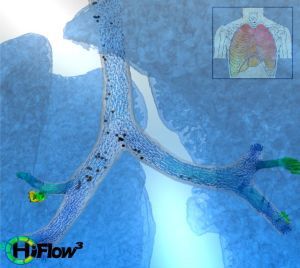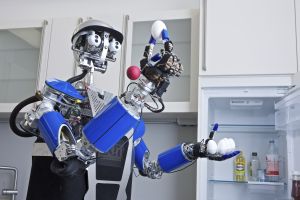At the CeBIT in Hanover, Karlsruhe Institute of Technology and the FZI Research Center for Information Technology will present innovations for our everyday life in the future. At the joint stand G33 in hall 26, a humanoid kitchen robot will move around, three-dimensional visualizations will open up new perspectives, and new algorithms will be presented to protect data in the cloud. The FZI House of Living Labs will present the interactive HoLLiE service robot and solutions for intelligent energy management.
ARMAR Robot Learns by Watching
A robot helping in the household no longer is a dream of the future. ARMAR, the humanoid robot, can understand commands and execute them independently. For instance, it gets the milk out of the fridge. Thanks to cameras and sensors, it orients itself in the room, recognizes objects, and grasps them with the necessary sensitivity. Additionally, it reacts to gestures and learns by watching a human colleague how to empty a dishwasher or clean the counter. Thus, it adapts naturally to man’s environment. At the CeBIT, ARMAR will show how it moves between a refrigerator, counter, and dishwasher.
A video on ARMAR can be found at:
http://www.youtube.com/watch?v=5x1G0nkSd9w
Virtual Knowledge for Real Problems
Numerical simulations open up inaccessible rooms. Three-dimensional visual processing of data provides fascinating insights and findings. A surgeon, for instance, can plan cardiac operations on the virtual model that is based on the data of the patient to be treated before he cuts the tissue. Simulations of the lungs yield predictions as to where fine dust has a harmful effect and how this effect can be prevented. In virtual city models, scientists let the air flow to predict where pollen concentrations will increase, such that allergic persons may be informed in due time on their mobile phones as to which quarters of the city they should avoid. Simulations make the world better to live in. With efficient methods, computers can solve complex problems. At the CeBIT, a large-area 3D video wall will give insight into the virtual world, with the models of the heart, lungs, and Karlsruhe city area being presented as examples.
More information on numerical simulations can be found at:
http://www.emcl.kit.edu/index.php

Safe in the Cloud
For companies, cloud computing is an inexpensive alternative to a computing center. But are sensitive company data at an external computing center protected against both external hackers and insiders? At the CeBIT, the demonstrator will show how this problem is solved: A database is encoded and distributed to three different computing centers. In this way, safe data storage in the cloud is achieved. Even if the hacker possesses insider knowledge of a cloud supplier, he cannot derive any useful information from the data set fragments of one computing center only. The combination of encoding with a smart distribution of the data significantly increases safety against internal and external attacks in the cloud.
More information on applied security technologies can be found at: http://www.kastel.kit.edu/
smartEnergy – Intelligent Energy Management
At the FZI House of Living Labs (HoLL), a novel platform is presently being established to study efficient and economic solutions for the complex energy system of the future. At the CeBIT, the Energy Management Panel (EMP) will be presented, a graphic interface for interaction between the decentralized energy management system in the building and the user. The user may specify individual parameters for his devices and configure the system according to his requirements. This ensures efficient load management without limiting user comfort. The user is informed about energy consumption and supply of all consumers, producers, and stores. These data increase the user’s awareness of energy flows in the building.
More information on the FZI House of Living Labs can be found at: http://www.fzi.de/index.php/de/forschung/fzi-living-labs/fzi-house-of-living-labs
Strategies for Trustable Hybrid Cloud Computing
Cloud computing offers potentials like dynamic scalability, elasticity, and low costs. Often, however, criteria like reliable service quality, simple connection of the own software stock, and security make companies refrain from the use of cloud computing.At the CeBIT, FZI will present how hybrid cloud computing solves the problem. An analysis and simulation method developed by FZI allows to develop an optimized cloud strategy tailored to the respective customer. Quality properties, such as performance, scalability, reliability, availability, and security, are in the focus. FZI adapts the use of cloud computing to individual needs and supports the decision on whether to use the public cloud, private cloud, or hybrid cloud. At the CeBIT, audriga, the spin-off of FZI and KIT, will present a solution for the safe relocation of groupware data in the cloud. At stand F30 in hall 26, audriga will present how the SaaS service helps users move their e-mail accounts, photos or files between cloud suppliers in a reliable manner.
More information on audriga can be found at: www.audriga.com
HoLLiE – The Service Robot of FZI
Providing persons, who are in need of care, with food and medicine, joining interactive sports games, offering entertainment, or guiding visitors – the applications of HoLLIE are manifold. The agile, two-armed service robot can be used flexibly in apartments and links robotics, ambient assisted living, and mobility services at FZI. At the CeBIT, HoLLiE (House of Living Labs intelligent Escort) will show how it intuitively interacts with people. Thanks to a modern 3D sensor system, HoLLiE can understand the body movement of its counterpart. In the scenario presented, HoLLiE asks its counterpart to do some sports together in order to remain in good shape. This function may be of therapeutic value to elderly people or people in need of care, but also serve to entertain everybody regardless of age.
More information on service robotics at FZI can be found at:
http://www.fzi.de/index.php/de/forschung/fzi-living-labs/fzi-living-lab-service-robotics
IT at KIT: This Year’s Highlights
At the CeBIT in Hanover on March 6, 2012, KIT will present current research from its focuses COMMputation as well as Anthropomatics and Robotics (hall 26, stand G33). Information technology will also be in the focus of KIT’s annual reception on March 22, to which numerous partners from industry and science have been invited. The first German department of informatics will celebrate its 40th anniversary at KIT in autumn.
FZI: Applied IT Research for Business
The FZI Research Center for Information Technology is an institution of the state of Baden-Württemberg and the former Universität Karlsruhe (TH), today’s Karlsruhe Institute of Technology (KIT). It has the legal status of a non-profit foundation under civil law. FZI is Baden-Württemberg’s hub of innovation in information technology and KIT’s innovation partner.The mission of FZI consists in supplying companies and public institutions with latest scientific findings relating to information technology in informatics, engineering sciences, and economics. Within the framework of cooperation and contract research projects, FZI develops concepts for business organization and software and systems solutions for its business partners. These solutions are implemented in innovative products, services, and business processes. At the FZI House of Living Labs, scientists and partners from business and society can exchange information and develop integrated solutions for information and communication technologies in an interdisciplinary manner. The FZI House of Living Labs covers the main research areas of smartAutomation, smartEnergy, smartHome, and smartMobility. The FZI House of Living Labs is funded by the European Union’s European Regional Development Fund (ERDF) and by the Baden-Württemberg Ministry of Finance and Economics.
Information technology at Karlsruhe Institute of Technology is bundled into two focuses. The KIT COMMputation Focus integrates communication and computation for development of devices with capabilities to interact, to perceive their environment, and to adapt to dynamically changing requirements. Researchers from the fields of informatics, electrical engineering, information technology, and economics cooperate to develop new concepts, architectures, methods, tools, and applications for the relevant complex systems.
The KIT Anthropomatics and Robotics Focus intends to improve the quality of life of humans. Using methods of informatics, mechanical engineering, electrical engineering, information technology, social sciences, and humanities, symbiotic systems are developed after the models of human anatomy, motor functions, perception, and behavior. The research topics range from machine intelligence, human-centered robotics, multimodal interaction and robot technology through to industrial robotics.
Being “The Research University in the Helmholtz Association”, KIT creates and imparts knowledge for the society and the environment. It is the objective to make significant contributions to the global challenges in the fields of energy, mobility, and information. For this, about 10,000 employees cooperate in a broad range of disciplines in natural sciences, engineering sciences, economics, and the humanities and social sciences. KIT prepares its 22,800 students for responsible tasks in society, industry, and science by offering research-based study programs. Innovation efforts at KIT build a bridge between important scientific findings and their application for the benefit of society, economic prosperity, and the preservation of our natural basis of life. KIT is one of the German universities of excellence.

